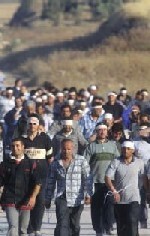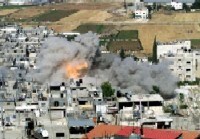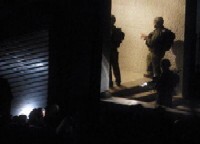
AP Photo/Brennan Linsley
‘Last Friday, at 1 am, six weeks after they moved their tanks on the outskirts of the city, Israeli forces invaded Nablus again. Despite the absence of resistance, they entered with all their tanks and this time also many military jeeps. As we have become accustomed to it, the whole city woke up after midnight due to the sounds of shooting and shelling.’
‘At the same time, Israeli occupation troops entered the garden of the Jadallah family in Rafidia, a neighboorhood in the eastern part of the city. They knocked on their door, captured their 36-years old son and used him as a human shield to arrest Issam Abu Baker, ‘a Fateh activist in Nablus’, that was staying at his parent’s home. Israeli soldiers took his wife and children hostage in a tank and kept them their to use against him in the case he would resist, eventhough he was not armed. After an hour the soldiers came back to the Jadallah family, captured the father and use him also as a human shield. He is in his late 70s and can barely see, due to diabetes. His daughter told the soldiers about his condition and that he could barely see at night and that someone like him cannot be of any help for them in whatever their mission was. Despite that, they insisted to take him.’
‘In Balata refugee camp, the occupation forces arrested all men in the age between 14 and 50 and gathered them in an oil factory near the refugee camp before taking them to an Israeli military base in Huwara. They spend a few days there, suffering from physical and psychological torture before the Israeli occupation forces decided about their fate. Thousands have been arrested and more than 2,000 were released and left to Askar refugee camp next to Balata refugee camp (see photo above). Until this moment they are not allowed to return home.’
‘The crowded Askar refugee camp hosted the men and boys in its mosques and shelters. Those who tried to return back to Balata were mistreated, tortured and arrested again. What is the reason behind this all? Why should these men stay at Askar refugee camp after Balata had been cleansed, except for more humiliation and collective punishment.’

REUTERS/Abed Omar Qusini
‘It seems that Palestinian resistance is never legitimised. During the 1936 uprising, which lasted for three years, more than 8,000 Palestinians were killed and injured. At that time, less than 20 percent of the land was confiscated by Jewish settlers, who were protected by the British coloniser. Also at that time Palestinian resistance was considered ‘terrorism’. Now in 2002, when practically 100 percent of Palestine’s land is occupied and more than 1500 Palestinians have been killed in less than two years, we still not have the right to defend ourselves and our resistance is still considered ‘terrorism’.’
‘After the refugees in Balata, it was Ein Beit Ilma’s turn. We woke up with the shelling of American-delivered Apache helicopters at the refugee camp. We heard Israeli soldiers calling through loudspeakers to the men in the refugee camp to come out of their homes and shelters onto the main street from where they were transferred in busses to the Israeli military base in Huwara.’

REUTERS/Goran Tomasevic
‘The Israeli occupation was not only back in the refugee camps. Every street in Nablus was occupied. Thousands have been arrested. After midnight on Friday, we saw more than one hundred soldiers surrounding a building next to ours. They knocked our neighbors’ door and captured their son, using him as a human shield to knock all doors of the building. They also brought dogs with them. There was no one in the building, except for seven students from Najah University. All were arrested, but two were released the following day. At around the same time on Saturday, the same soldiers surrounded the same building and knocked the door of the same neighbors and took their same son as a human shield. The same residents were led outside the building.’
‘The neighbors who were watching and waiting, including ourselves, as well as the building’s residents had no doubt that the building or an apartment in the building will be blown up. Why else would they come again in the same building in less than 24 hours? We woke up the children to prepare them for what will be heard. After four hours of tension the soldiers didn’t find anything or anybody and probably in order not to leave empty handed, they arrested the two guys who were already released the same day. What could have happened in less than 24 hours in a building located in a city under curfew, where no one is allowed outside their homes. What is the reason behind this? What could possibly be the reason, except more threats, more humiliation and install fear.’
‘Sunday afternoon, my nephew Bassam, who will be three years in July, ran to the balcony, holding his plastic gun, when he heard four Israeli military jeeps driving through our street. There were three prisoners inside the military jeep. We shouted to little Bassam to drop his toy, fearing that the Israeli soldiers would see him standing at the balcony. We told him that the soldiers would shoot him if they see him there. Little Bassam looked at us and said: ‘let them shoot me, I am not afraid of them.’

AP Photo/Brennan Linsley
The first picture shows dozens of Palestinian men, still defiantly carrying their handcuffs and blindfolds, who were detained by the Israeli occupation army, finish a five kilometer walk into Nablus, where their homes remain off limits on June 3, 2002 (AP Photo/Brennan Linsley). The second picture shows smoke rising from the home of the Mahmoud Titi, after the Israeli occupation forces demolished his home with explosives in the Balata refugee camp on June 2, 2002 (REUTERS/Abed Omar Qusini). The third picture shows a Palestinian woman in her shelter, trashed by Israeli occupation troops in Balata refugee camp, June 4, 2002 (REUTERS/Goran Tomasevic). The fourth picture shows an Israeli soldier shining a light into the faces, at left, of Palestinian men, women and children, pulled out of their apartment building and made to sit on the ground, while other soldiers entered the building, after midnight in Nablus, Sunday, June 2, 2002 (AP Photo/Brennan Linsley).




